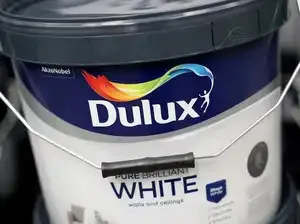Akzo Nobel NV agreed to acquire smaller rival paint maker Axalta Coating Systems Ltd. in a deal that will create a US-listed leader with combined annual sales of almost $17 billion.
Under the agreement, which confirmed an earlier report by Bloomberg News, Amsterdam-based Akzo Nobel will own 55% of the combined entity, whose brands range from Dulux to Cromax. After trading for some three decades in Amsterdam, the share listing will move to New York while the companies will maintain headquarters in the Netherlands and Philadelphia.
The deal, creating a business with an estimated enterprise value of about $25 billion, follows several previous efforts to bring the two under the same umbrella, with talks breaking down in 2017. It adds to a flurry of activity in the sector, with Carlyle Group Inc. agreeing in October to buy control of BASF SE’s coatings business.
Tariffs and a slowing economy have been weighing on the coatings industry, with Akzo Nobel last month lowering its earnings outlook because its customers, among them automotive clients directly hit by extra duties, have been spending less. It has been overhauling its strategy to cut costs and boost efficiency, closing some European sites and shedding 2,500 jobs.
Akzo Nobel and Axalta framed the deal as a merger of equals. Akzo Nobel investors will get a special cash dividend of €2.5 billion, while each company will contribute four directors to the new board, in addition to three independent members. Current Akzo Nobel Chief Executive Officer Gregoire Poux-Guillaume will lead the combined company, while Axalta Chairman Rakesh Sachdev will lead the board. Ben Noteboom, chairman of Akzo Nobel’s supervisory board, will serve as vice chair.
“This is a combination that we’ve looked at multiple times in the past, but this is also a combination that the markets have been asking for for a long time,” Poux-Guillaume said in an interview. “There were further attempts since 2017. Now, from a business perspective, it makes too much sense to ignore.”
Tuesday’s agreement will see shareholders receive 0.6539 Akzo Nobel shares for each Axalta common share. The Dutch company’s stock fell 3.7% in afternoon trading in Amsterdam. Axalta was up less than 1% in New York.
“Management have their work cut out to convince shareholders that this is the right step for Akzo Nobel,” Bernstein analyst James Hooper said in a note. “Revenue growth expectations need to be addressed.”
The new company will in time end trading in Amsterdam to move to the New York Stock Exchange, with a majority of Akzo Nobel shares already held by US investors, according to Poux-Guillaume.
The business will span more than 160 countries and drive run-rate synergies of about $600 million, 90% of which are expected within the first three years of the close of the transaction, according to a statement.
“The macro environment is impacting both companies in the same way and therefore there isn’t anybody that’s gaining an advantage from that macro environment,” said Poux-Guillaume, adding the targeted recurring cost synergies were “really reassuring for shareholders” because “that stuff is mechanical.”
This year, Cevian Capital has built a 5% stake in Akzo Nobel, putting its weight behind a strategy change. The activist investor’s involvement in other European companies has often pushed its targets toward mergers and acquisitions. Cevian wasn’t involved in the decision to merge with Axalta, Poux-Guillaume said.
Axalta went public in 2014, a year after Carlyle acquired the company from DuPont.
Morgan Stanley acted as financial adviser for Akzo Nobel, while its supervisory board worked with Lazard Inc. Evercore Inc. and JPMorgan Chase & Co. were co-lead financial advisers to Axalta, which also got advice from Incentrum Group.
Under the agreement, which confirmed an earlier report by Bloomberg News, Amsterdam-based Akzo Nobel will own 55% of the combined entity, whose brands range from Dulux to Cromax. After trading for some three decades in Amsterdam, the share listing will move to New York while the companies will maintain headquarters in the Netherlands and Philadelphia.
The deal, creating a business with an estimated enterprise value of about $25 billion, follows several previous efforts to bring the two under the same umbrella, with talks breaking down in 2017. It adds to a flurry of activity in the sector, with Carlyle Group Inc. agreeing in October to buy control of BASF SE’s coatings business.
Tariffs and a slowing economy have been weighing on the coatings industry, with Akzo Nobel last month lowering its earnings outlook because its customers, among them automotive clients directly hit by extra duties, have been spending less. It has been overhauling its strategy to cut costs and boost efficiency, closing some European sites and shedding 2,500 jobs.
Akzo Nobel and Axalta framed the deal as a merger of equals. Akzo Nobel investors will get a special cash dividend of €2.5 billion, while each company will contribute four directors to the new board, in addition to three independent members. Current Akzo Nobel Chief Executive Officer Gregoire Poux-Guillaume will lead the combined company, while Axalta Chairman Rakesh Sachdev will lead the board. Ben Noteboom, chairman of Akzo Nobel’s supervisory board, will serve as vice chair.
Business Perspective
Efforts to consolidate have been under way for years. In 2017, when Akzo Nobel first explored a combination with Axalta, it also fended off a bid from US rival PPG Industries Inc.“This is a combination that we’ve looked at multiple times in the past, but this is also a combination that the markets have been asking for for a long time,” Poux-Guillaume said in an interview. “There were further attempts since 2017. Now, from a business perspective, it makes too much sense to ignore.”
Tuesday’s agreement will see shareholders receive 0.6539 Akzo Nobel shares for each Axalta common share. The Dutch company’s stock fell 3.7% in afternoon trading in Amsterdam. Axalta was up less than 1% in New York.
“Management have their work cut out to convince shareholders that this is the right step for Akzo Nobel,” Bernstein analyst James Hooper said in a note. “Revenue growth expectations need to be addressed.”
The new company will in time end trading in Amsterdam to move to the New York Stock Exchange, with a majority of Akzo Nobel shares already held by US investors, according to Poux-Guillaume.
Consumer Brands
The deal combines companies with strengths in business-to-business as well as consumer markets. Axalta, a former division of DuPont de Nemours Inc., makes finishing materials for a variety of industrial uses, including powder coatings used in auto manufacturing. Akzo Nobel owns a number of consumer brands, including Dulux, Cuprinol and Hammerite, along with Polyfilla crack fillers.The business will span more than 160 countries and drive run-rate synergies of about $600 million, 90% of which are expected within the first three years of the close of the transaction, according to a statement.
“The macro environment is impacting both companies in the same way and therefore there isn’t anybody that’s gaining an advantage from that macro environment,” said Poux-Guillaume, adding the targeted recurring cost synergies were “really reassuring for shareholders” because “that stuff is mechanical.”
This year, Cevian Capital has built a 5% stake in Akzo Nobel, putting its weight behind a strategy change. The activist investor’s involvement in other European companies has often pushed its targets toward mergers and acquisitions. Cevian wasn’t involved in the decision to merge with Axalta, Poux-Guillaume said.
Axalta went public in 2014, a year after Carlyle acquired the company from DuPont.
Morgan Stanley acted as financial adviser for Akzo Nobel, while its supervisory board worked with Lazard Inc. Evercore Inc. and JPMorgan Chase & Co. were co-lead financial advisers to Axalta, which also got advice from Incentrum Group.





